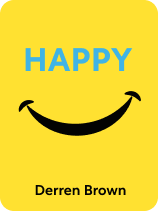

This article is an excerpt from the Shortform book guide to "Happy" by Derren Brown. Shortform has the world's best summaries and analyses of books you should be reading.
Like this article? Sign up for a free trial here.
What are the opinions of Stoicism on anger? Why is anger the most destructive emotion? How can you manage your anger better?
On anger, Stoicism claims it is the single most destructive emotion to happiness. According to author Derren Brown, whose book Happy explored the ancient Greek philosophy of obtaining true happiness, anger is one of the three major obstacles to living a well-balanced and fulfilling life.
Read on to learn how Stoicism explains anger and strategies to defuse it, according to Brown’s book.
Stoicism and Anger
Drawing directly from the Stoics and Epicureans, Happy author Derren Brown bases his philosophical approach to happiness on the age-old aphorism that the circumstances of our lives aren’t what make us unhappy, but rather how we react to them. In his book, Brown explores the opinions of Stoicism on anger as well as other destructive emotions like envy and desire. He suggests that the cornerstones of happiness are for us to choose contentment over perfection, take responsibility for our lives, and become the authors of our internal narratives.
Even though we accept it as a given that the pursuit of happiness is core to human nature, most of us suffer from misguided notions about what happiness is, fueled by messages from the media and society. Instead of seeking contentment in the everyday balance between our aims and our troubles, the world at large would have us believe that happiness is something we can win like a trophy. Given that unrealistic societal message, Brown identifies three major obstacles to living a well-balanced, happier life—our culture’s insistence on positive thinking, the ways we let ourselves give in to anger, and the importance we attach to our ambitions and desires.
Below, we’ll look into the obstacle of anger and the Stoicism insights on anger as a destructive emotion, according to Brown’s analysis.
Giving In to Anger
Once your slide into unhappiness begins, more likely than not, you’ll get angry. Anger (along with its cousin, frustration) is the single emotion most destructive to happiness. While anger often feels justified, Brown argues that it clouds anything you might want to communicate, distracts from the issue at hand, and doesn’t resolve anything to your satisfaction. Brown then explains the basic triggers of anger and the steps you can take to disarm it.
(Shortform note: Brown’s depiction of anger and how it’s expressed may seem a little simplistic. Not all anger is loud, showy, and distracting. People who develop an aversion to this type of anger may manifest it in other ways—through withdrawal, self-blame, or unhealthy coping mechanisms. Though this form of anger is more subtle and unconscious, it’s just as destructive to happiness.)
Anger has an evolutionary social purpose; it encourages others not to violate social rules. Brown writes that we feel anger when someone breaks a rule or when we perceive a personal slight (such as when someone cuts ahead of us in line). Anger can also be born out of a combination of irritants and our own temperament (such as when you get frustrated after hearing a song played over and over during the holidays).
(Shortform note: In Atlas of the Heart, Brené Brown describes how anger combines with other emotions to produce even more unhappy states of mind. Anger, she says, is how we react when something disrupts how we think things should be. When compounded with disgust (a strong aversion) anger becomes contempt—a feeling that not only has someone done wrong, but that they’re a fundamentally bad person. Contempt mixed with fear turns into hate, the negative emotional state that brings out the worst in human behavior.)
However, anger tricks us into ignoring our boundaries on what we consider acceptable in our own behavior. We react with shouting, aggression, and even physical violence that we would never condone in others. In that way, displays of anger become a distraction from the issues that ignite them. Instead, anger starts a spiral of back-and-forth retaliation that damages our relationships, leads to regret, and triggers even more unhappiness in the end, both for us and others.
(Shortform note: Not everyone agrees with the Stoicism perspective on anger that anger inevitably leads to reprisals, but you should be careful about how you express it. In Nonviolent Communication, Marshall B. Rosenberg says that anger should be honored and expressed, but in a nonviolent way. He suggests that empathy is crucial to the process, both for yourself and the person you’re angry with. Only then can you address the triggering issue without losing your sense of connection.)
Because of this, Stoicism rejected anger as a valid motivation for behavior. It negates our openness to others and turns us against those whom we want to persuade. But what about situations in which anger feels appropriate, such as when fighting against social injustice? Can’t anger have a positive impact? Brown suggests that the key is to change it into something more constructive, such as in the examples of Mahatma Gandhi and Martin Luther King. They acknowledged the anger that fueled people’s desire for justice, then shifted that anger into a positive drive for change.
(Shortform note: In How to Be an Antiracist, Ibram X. Kendi argues that antiracist actions such as demonstrations, while laudable, are ineffective because they’re targeting the wrong emotions. While giving voice to the anger that racism engenders, demonstrations fail to address racism’s systemic cause—policies put in place not because of anger or hate, but because of greed and self-interest, a completely different emotional motivation. Far more effective are long-term, organized protest movements that aim at reforming the societal structure underlying social injustice.)
After presenting the Stoicism perspective on anger, Brown offers several strategies to defuse anger. The first is simply to wait anger out—a delayed reaction creates emotional distance and gives you time to reframe your judgment. Another is to stop being curious about things you know will make you angry—for instance, by avoiding social media or keeping out of office gossip. But perhaps the most effective way to truly deal with anger is through empathy—recognizing that you and the person you’re angry with have much in common, and doing your best to understand their point of view. Whatever approach you take to interrupt your anger, philosophers and psychologists agree that the best time to do it is right away, before anger is able to fester.
(Shortform note: In Emotional Intelligence, Daniel Goleman gives a few more techniques to short-circuit anger. In addition to Brown’s ideas, Goleman suggests writing down angry thoughts when you have them to increase your self-awareness. However, in Emotional Intelligence 2.0, Travis Bradberry and Jean Greaves claim that if you express your anger in an intentional manner, it can be a strategic motivator—for example, it can sometimes spur people into action.)

———End of Preview———
Like what you just read? Read the rest of the world's best book summary and analysis of Derren Brown's "Happy" at Shortform.
Here's what you'll find in our full Happy summary:
- The definition of happy, according to ancient Greek philosophers and Stoics
- The importance of balancing desires with realities
- How to overcome the three biggest barriers to happiness






